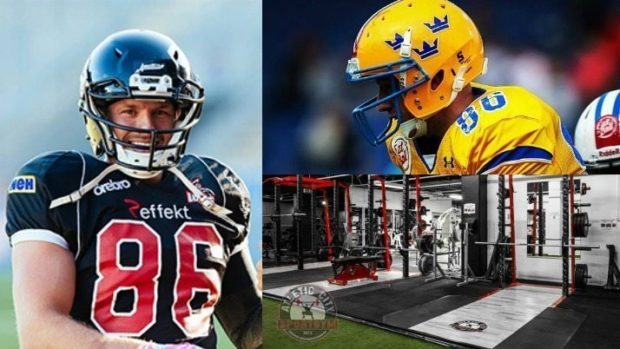Johan Stål is a well known name in Swedish American football. He just finished his 18th season of playing for both his hometown Örebro Black Knights and the Carlstad Crusaders. Having set numerous records as a receiver and defensive back, he has turned his attention to improving the strength and conditioning of athletes, with his own unique focus on American football.
Out of his own gym – Atletic City Sportgym – Stål has been working as the strength coach for the Black Knights since 2011, and he has a slightly different way of looking at strength training.
Let Johan tell you his approach in his own words.
Strength training and American football are synonymous. If you want to have success in American football you need to get yourself to the gym on a weekly basis and do some hard work. But what exactly are you doing in the gym when you are there? Are you using your time in the best way to become a better football player?
There are many strength coaches around the world and most of them have their own way of helping develop athletes in the weight room. And it is really difficult to say you are wrong and I am right since people react differently to different strength programs.
First of all, every player should create a strong foundation by getting strong in the basic exercises like squats, cleans, bench press and maybe deadlifts (not a big fan of deadlifts). It is after this strong foundation has been built that my “special” programs kick in. Keep in mind that a strong foundation can take 1-4 years to build up.
Linemen
For linemen, I still use a lot of the basic exercises but I will always prefer the front squat over regular squats because in a front squat you are using a more upright athletic form plus you have to activate your core more. I use different depths depending on where the player is in the program. If we are at the end of a maximum strength period I might use quarter depths in the squat. Bench press is still used but we place more emphasis on using one-arm dumbbells and close grip bench presses because I simply think they relate more to the sport than what regular bench presses do.
Skill Players
Here is where you might think I do some strange exercises. But first let us look at the positions and why not choose my old position, wide receiver. How often do you see a wide receiver run routes with both feet on the ground at the same time? Think about that.……………..not too often right? A receiver uses one leg at the time when he runs, he breaks down with one leg at a time, and he explodes out of routes with one leg.
So why doesn’t he train on one leg a time? One-legged squats, one-legged hang cleans, one-legged straight leg deadlifts and so on……(see the links below for examples of exercises)
I have done this with the Black Knights for several years now and I have seen amazing results. We did tests with the team. Of course, we did broad jump with two legs as a standard test but we also did one-legged jumps. And with the results, I could see that the players who trained mostly on one leg increased both jumps while the players training mostly on two legs only increased their two-legged broadjump and their one-legged broadjump had the same results.
I could also see that even though players did not do cleans with two legs they still increased the weight at the next max-test date, and almost with the same percent increase as the players that did regular cleans.
So to summarize, one-legged training will transfer to two-legged exercises while two-legged exercises will not transfer over to one-leg exercises.
This is my philosophy when it comes to strength training and it has produced great results not only for the team – the Örebro Black Knights – but also for myself as I have been applying this philosophy for more than seven years now in my own training regime.

